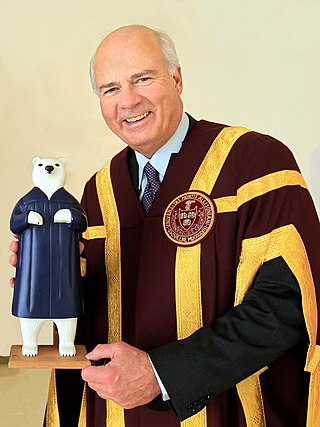The CTV Television Network, commonly known as CTV, is a Canadian English-language terrestrial television network. Launched in 1961 and acquired by BCE Inc. in 2000, CTV is Canada's largest privately owned television network and is now a division of the Bell Media subsidiary of BCE. It is Canada's largest privately or commercially owned network consisting of 22 owned-and-operated stations nationwide and two privately owned affiliates, and has consistently been placed as Canada's top-rated network in total viewers and in key demographics since 2002, after several years trailing the rival Global Television Network in key markets.

The Global Television Network is a Canadian English-language terrestrial television network. It is currently Canada's second most-watched private terrestrial television network after CTV, and has fifteen owned-and-operated stations throughout the country. Global is owned by Corus Entertainment — the media holdings of JR Shaw and other members of his family.

Peter Mansbridge is a British-born Canadian retired news anchor. From 1988 to 2017, he was chief correspondent for CBC News and anchor of The National, CBC Television's flagship nightly newscast. He was also host of CBC News Network's Mansbridge One on One. Mansbridge has received many awards and accolades for his journalistic work, including an honorary doctorate from Mount Allison University, where he served as chancellor until the end of 2017. On September 5, 2016, the Canadian Broadcasting Corporation announced that Mansbridge would be stepping down as chief correspondent and anchor on July 1, 2017, after the coverage of Canada's 150th-anniversary celebrations.

Canada AM was a Canadian morning television news show that aired on CTV from 1972 to 2016. Its final hosts were Beverly Thomson and Marci Ien, with Jeff Hutcheson presenting the weather forecast and sports. The program aired on weekdays, and was produced from CTV's facilities at 9 Channel Nine Court in Scarborough, Toronto.
CBC News Network is a Canadian English-language specialty news channel owned by the Canadian Broadcasting Corporation (CBC). It broadcasts into over 10 million homes in Canada. As Canada's first all-news channel, it is the world's third-oldest television service of this nature, after CNN in the United States and Sky News in the United Kingdom.
The National is a Canadian national television news program which serves as the flagship broadcast for the English-language news division of CBC News by the Canadian Broadcasting Corporation. It reports on major Canadian and international news stories, airing on CBC Television stations nationwide weeknights and Sundays at 10:00 p.m. local time.
CBLT-DT is a television station in Toronto, Ontario, Canada, serving as the flagship station of the English-language service of CBC Television. It is part of a twinstick with Ici Radio-Canada Télé outlet CBLFT-DT. Both stations share studios at the Canadian Broadcasting Centre on Front Street West in downtown Toronto, which is also shared with national cable news channel CBC News Network and houses the studios for most of CBC's news and entertainment programs. CBLT-DT's transmitter is located atop the CN Tower.

Pamela Wallin is a Canadian senator, former television journalist, and diplomat. She was appointed to the senate on January 2, 2009, where she initially sat as a Conservative.
Pamela Wallin Live was a Canadian interview series which aired on CBC Newsworld from 1995 to 1999. It was hosted by Pamela Wallin.
CBC News is a division of the Canadian Broadcasting Corporation responsible for the news gathering and production of news programs on the corporation's English-language operations, namely CBC Television, CBC Radio, CBC News Network, and CBC.ca. Founded in 1941, CBC News is the largest news broadcaster in Canada and has local, regional, and national broadcasts and stations. It frequently collaborates with its organizationally separate French-language counterpart, Radio-Canada Info.

Ian Harvey Hanomansing is a Canadian television journalist with the Canadian Broadcasting Corporation (CBC). He formerly hosted CBC News Network Vancouver on CBC News Network, and reports for CBC Television's nightly newscast, The National.
Midday is a newsmagazine television program broadcast on CBC Television, which ran from January 7, 1985 to June 30, 2000, replacing local noon-hour newscasts on CBC stations. The program, which aired from noon to 1 p.m. on weekday afternoons, presented a mix of news, lifestyle and entertainment features.
CBC Television is a Canadian English-language broadcast television network owned by the Canadian Broadcasting Corporation, the national public broadcaster. The network began operations on September 6, 1952. Its French-language counterpart is Ici Radio-Canada Télé.
Friday Night! with Ralph Benmergui was a Canadian television variety show, which aired on CBC Television from 1992 to 1993. The show initially aired at 10 p.m., following Prime Time News, but was moved to 11 p.m. in January 1993 and aired in the later time slot for the remainder of its run.
CBC News: Sunday Night was a television newsmagazine series in Canada, which aired on Sunday evenings at 10 p.m. on CBC Television. It was, essentially, the Sunday night equivalent of The National, although it took a more features-oriented approach than its weekday counterpart. The program also aired on CBC Newsworld at 9 p.m., and is repeated at midnight and 5 a.m. the following morning.

CTV National News is the flagship newscast of CTV News, the news division of the CTV Television Network, which airs at 11:00 pm local time on the CTV stations across Canada, and is produced from CTV's facilities at 9 Channel Nine Court in Scarborough, Toronto, Ontario. It also airs on CTV News Channel, CTV's 24-hour cable news television channel, live at 10:00 pm Eastern—or 11:00 Atlantic, when the newscast begins its nightly run across the network—with hourly repeats until 2:00 am Eastern. The previous day's newscast can be seen on the Internet.
CTV News is the news division of the CTV Television Network in Canada. The name CTV News is also applied as the title of local and regional newscasts on the network's owned-and-operated stations (O&Os), which are closely tied to the national news division. Local newscasts on CTV 2 are also branded as CTV News, although in most cases they are managed separately from the newscasts on the main CTV network.
Benmergui Live was a Canadian television talk show, which aired daily on CBC Newsworld in the 1990s. Hosted by Ralph Benmergui, the series centred on discussions of political, social or cultural topics with panel guests, studio audience discussion and phone-in segments.

The One: Making a Music Star is an American reality television series that aired in July 2006 on ABC in the United States, and CBC Television in Canada. The show was hosted by George Stroumboulopoulos, the host of CBC's The Hour. It was advertised as being superior to American Idol and Rock Star with the twist that contestants "live together in a fully functioning music academy", with their actions documented similar to the Big Brother format.

Established in 2007, Canada's Olympic Broadcast Media Consortium was a joint venture set up by Canadian media companies Bell Media and Rogers Media to produce the Canadian broadcasts of the 2010 Winter Olympics in Vancouver, British Columbia, Canada, and the 2012 Summer Olympics in London, England, as well as the two corresponding Paralympic Games. Bell owned 80% of the joint venture, and Rogers owned 20%.








